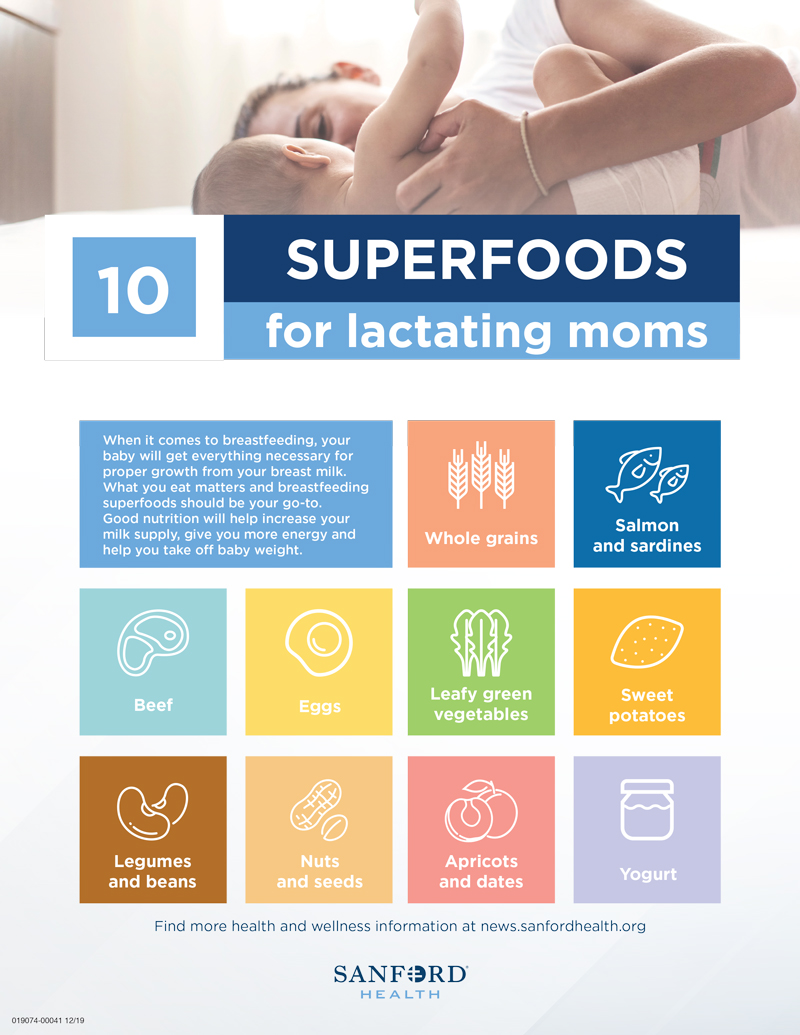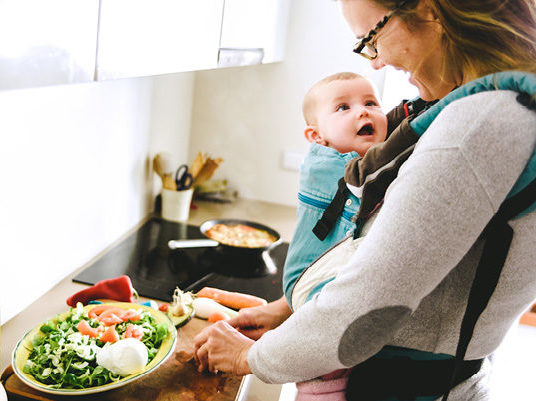When it comes to breastfeeding, your baby will get everything necessary for proper growth from your breast milk. What you eat matters and breastfeeding superfoods should be your go-to. Good nutrition will help increase your milk supply, give you more energy and help you take off baby weight.
Find breastfeeding support: Lactation specialists at Sanford Health
In fact, some foods are better than others. Let’s take a look at 10 superfoods for lactating moms. And some ways you can easily incorporate them into your daily intake.
1. Whole grains
- Breads
- Rice
- Pasta
- Oatmeal
Brown rice, whole-wheat pasta and oatmeal are all complex carbohydrates, meaning they keep you feeling full longer, and you won’t get those energy dips you do with refined carbohydrates. Whole grain versions — are an important source of B vitamins, minerals and fiber. Fiber helps you feel full longer, keeps blood sugar levels steady and aids in digestion. Make oats a part of your diet every day. They are really rich in fiber and help in milk production. Plus, they are high in iron.
2. Salmon and sardines
An excellent source of protein, salmon is rich in vitamin B12 and omega-3 fatty acids. It is also one of only a few sources that has natural vitamin D, and many women have vitamin D deficiencies. B12 and omega-3 are thought to help ward off postpartum depression. Salmon is great for breastfeeding moms because it contains large amounts of DHA, a type of fat important for the development of a baby’s nervous system. Wild-caught, farm-raised or canned salmon is good for you. Both salmon and sardines can increase breast milk production.
3. Beef
Breastfeeding moms have more need for the mineral zinc. Beef is a high-quality protein rich in zinc, iron and B vitamins. It helps you maintain your energy, and we all know having a new baby at home requires lots of energy. Choose grass-fed beef when you can because it has more omega-3 fatty acids and doesn’t have added antibiotics and hormones.
4. Eggs
Eggs are rich in protein, choline, lutein, vitamins B12 and D, riboflavin and folate. They are a quick, easy meal or snack. Eat the whole egg for optimal nutrition. New research shows eggs will not increase your cholesterol.
Enlarge

Infographic by Sanford Health
5. Leafy green vegetables
Leafy greens are rich in vitamins A, C, E and K as well as fiber, antioxidants and minerals including calcium. Plus — drum roll — they are so low in calories you can eat them all day long and not have to worry about how many calories you have consumed. Shoot for a minimum of one serving a day. Get creative. Put them in your breakfast omelets, smoothies, salads, stir-fry, casseroles, etc. Broccoli and Swiss chard are nutrient-dense and high in calcium; spinach is rich in iron. (Remember Popeye?) When you just don’t have time to wash, cut and prepare veggies, buy the pre-cut veggie trays. You can use them for cooking too. Or go to the frozen section for steamer veggie bags. They also have great nutritional value.
6. Sweet potatoes
Just one medium sweet potato meets the daily recommendation of vitamin A for breast-feeding moms. Vitamin A is important for vision, bone growth, immune function and cell specialization. Your baby is dependent on your dietary intake to get the vitamin A required for growth and development. That’s another advantage of breast-feeding. Breast-fed babies are very rarely found to be deficient in vitamin A. Sweet potatoes are an excellent source of potassium too.
7. Legumes and beans
As great sources of protein, iron and fiber, legumes and beans belong in your diet. They also have lots of minerals and phytochemicals — naturally, non-nutrient chemicals a plant produces. According to the American Institute for Cancer Research, studies on phytochemicals have shown they can stimulate the immune system, block bad substances we eat, drink and breathe from becoming carcinogens (cancer causing), reduce the kind of inflammation that makes cancer growth more likely, prevent DNA damage, help with DNA repair, reduce the kind of oxidative damage to cells that can spark cancer and help to regulate hormones. So eat chili, bean dip, bean casseroles and anything bean related. Add chickpeas to your salads. Have some hummus on crackers. Worried about gas? Well, beans and legumes do have that tendency, but they won’t bother your baby and their advantageous qualities are worth a bit of rippling.
8. Nuts and seeds
Nuts and seeds contain protein, fiber, vitamins, minerals, antioxidants and healthy monounsaturated and polyunsaturated fats. They are good for your skin, help you stay younger looking and protect you from heart disease. Almonds are touted as great for breastfeeding moms because they are a good non-dairy source of calcium. (Breastfeeding moms should have 1,000 mg of calcium daily.) Your milk is high in calcium, and if you don’t get enough of it in your diet, it could negatively impact your bones and teeth. Try almonds by the handful, mix them into snacks, pasta and casseroles, and bring out the almond butter when you take out that box of crackers.
On the seeds side, try sesame seeds. They also are packed with calcium as well as fiber, iron, magnesium, phosphorus, copper and manganese. Toast and sprinkle them over a salad or veggies. (Caution: If family members have a history of nut allergies, stay away from almonds until your baby is at least three months old. That’s because food proteins can easily pass from mom to baby’s bloodstream in the first three months.)
9. Apricots and dates
Eating apricots and dates can increase prolactin, which is the hormone that tells your body to produce milk. Apricots contain essential nutrients such as dietary fiber, vitamin A, vitamin C and potassium. Fresh is better than canned. If you have to go with canned, avoid apricots packed in syrups. Dried apricots are an easy snack to keep in your purse for a quick bite. Dates are also calcium-rich, high in fiber and naturally sweet.
10. Yogurt
We’ve told you that calcium is important. Get some of the required 1,000 mg a day from low-fat or Greek yogurt. It’s also a good source of protein. There are so many flavors available that you are sure to find ones you like. Add fruit or granola for an even yummier yogurt. (Caution: If your baby has been diagnosed with milk protein intolerance, dairy products like yogurt should not be part of your diet.)
There are many more foods that various studies have deemed great for breastfeeding moms, among them: avocados, pumpkin seeds, garlic in all forms and some lesser known ones like fenugreek and curry. What’s really important is eating a varied diet of natural, unprocessed foods.
And now that you can’t wait to start eating all these superfoods, don’t forget one more equally essential non-food addition to your diet: water, water, water! Keep a water bottle handy and drink it throughout the day. Before you sit down to breastfeed, drink a glass of water. After you are done breastfeeding, drink a glass of water. Make water your first choice, but all non-caffeinated, unsweetened beverages are good too. Drinking sufficient water is so important for milk supply. Too little water also dehydrates you and makes you feel sluggish and slow.
Learn more
- Breastfeeding basics: Tips on nursing in public
- How to avoid mastitis while breastfeeding
- Barriers to breastfeeding and how to overcome them
…
Posted In Health Information, Nutrition, Pregnancy, Women's
